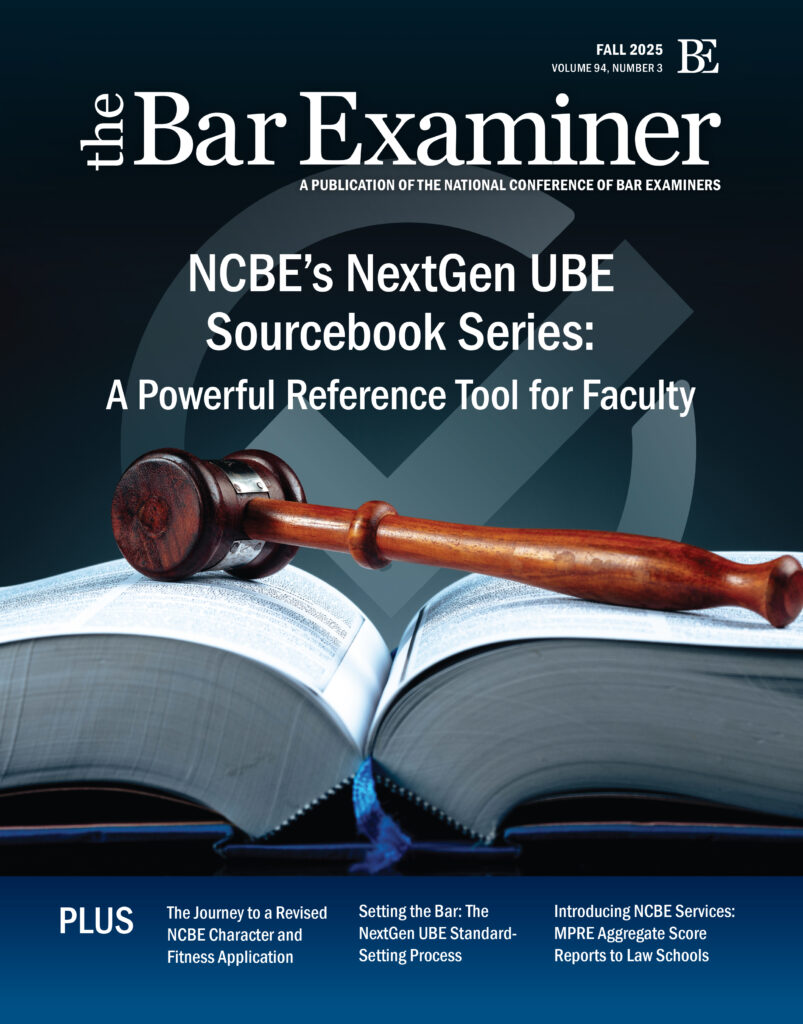This article originally appeared in The Bar Examiner print edition, Spring 2024 (Vol. 91, No. 4), pp. 81–82.

Sovereign Immunity
Mitchell factors
The US Court of Appeals for the Ninth Circuit sua sponte took up a case involving Attorney Benjamin Kohn, whose complaint regarding denied testing accommodations was dismissed in California. The Court took up the case to consider whether the Mitchell factors should still be employed in cases regarding sovereign immunity and found that they have not kept pace with recent US Supreme Court case law. In their place, the Court adopted a three-factor test from the DC circuit and decided that the California State Bar remains an arm of the state entitled to sovereign immunity.
Attorney Benjamin Kohn applied for and was denied accommodations on the bar examination by the California State Bar; doing so, he alleged in a complaint, violated Title II of the Americans with Disabilities Act, Section 504 of the Rehabilitation Act, sections of the California Government Code, and California’s Unruh Civil Rights Act. Kohn sought monetary damages and other relief. The State Bar moved to dismiss the complaint, in part due to the Eleventh Amendment’s grant of sovereign immunity. The US District Court for the Northern District of California “granted the motion to dismiss and quoted Hirsh [v. Justs. of the Sup. Ct. of Cal.]’s clear holding for support: ‘The Eleventh Amendment’s grant of sovereign immunity bars monetary relief from state agencies such as California’s Bar Association and Bar Court’” (6). While the state itself is not party to this case, such immunity has been applied to “arm(s) of the state.”
The US Court of Appeals for the Ninth Circuit “sua sponte took this case en banc to decide whether (1) the Mitchell factors . . . remain the optimal means to conduct an arm of the state analysis; and (2) the California State Bar enjoys Eleventh Amendment protection under a more rigorous scrutiny than it received in Lupert [v. Cal. State Bar] and Hirsh” (8). The so-called Mitchell factors (based on Mitchell v. L.A. Cmty. Coll. Dist.) usually include the following:
(1) whether a money judgment would be satisfied out of state funds, (2) whether the entity performs central governmental functions, (3) whether the entity may sue or be sued, (4) whether the entity has the power to take property in its own name or only the name of the state, and (5) the corporate status of the entity (11–12).
Kohn argued that the first factor should be considered primary, but the Court found that the Mitchell factors have failed to keep up with recent developments at the Supreme Court level, including Hess v. Port Auth. Trans-Hudson Corp.’s emphasis on the “Eleventh Amendment’s ‘twin reasons for being’” (13). The Court of Appeals also found that the third and fourth Mitchell factors have been of little relevance, and that analysis of the second factor has introduced some “inconsistency” (17). With this in mind, the Court settled on a different three-factor test from the DC Circuit, citing Puerto Rico Ports Authority v. Federal Maritime Commission: “‘(1) the [s]tate’s intent as to the status of the entity, including the functions performed by the entity; (2) the [s]tate’s control over the entity; and (3) the entity’s overall effects on the state treasury’” (18). The Court adopted this test (and its entity-based approach) in place of the Mitchell factors.
Using the new test, the Court found that the State Bar is still an arm of the state and entitled to sovereign immunity. Regarding the first factor, that “[t]he State Bar is codified in the California Constitution”; its property is “held for essential public and governmental purposes in the judicial branch of the government”; and “[t]he California Supreme Court’s description of the State Bar as its ‘administrative arm’ for attorney discipline and admission purposes” (21–22), among other elements, fulfill this factor.
For the second, regarding “control,” the California state government appoints the State Bar’s Board of Trustees and Committee of Bar Examiners; reviews and approves admission rules (through the California Supreme Court); and holds power over the State Bar’s fundraising (via the state legislature).
The third and final test factor, the Court found, “presents a closer call” in this case (31). However, it “cannot overcome the first two” factors of the test on its own in this context, and there is “no reason to disturb [the Court’s] nearly forty-year-old determination that the California State Bar is an arm of the state and entitled to immunity in federal court” (31–32). The Court then remanded the remainder of the case’s issues to the original judicial panel.
See Kohn v. State Bar of California, 87 F.4th 1021
Contact us to request a pdf file of the original article as it appeared in the print edition.







